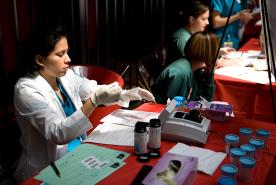Table of Contents
- What are vitamins and minerals?
- How do I know if I’m not getting enough vitamins and minerals?
- Why do I need different amounts of vitamins and minerals?
- Which supplements will I need to take?
- Which vitamins do I need to avoid if I have kidney disease?
- Is it safe to use herbal remedies?
- Looking for Nutrition Guidance?
Are you getting enough vitamins and minerals for your health? If you have chronic kidney disease or kidney failure, here’s what you need to know.
What are vitamins and minerals?
Vitamins and minerals are substances your body needs to help carry out important functions. They work to help your body get energy from the foods you eat, help repair tissue, and help maintain life. Therefore, they are essential for your body. But if you have kidney disease or are on dialysis, you may not be getting enough.
How do I know if I’m not getting enough vitamins and minerals?
Almost all vitamins and minerals come from the foods you eat. Your body cannot make these substances. People with healthy kidneys who eat a variety of foods from all the food groups (meats, grains, fruits, vegetables and dairy products) can get enough vitamins and minerals. But if you have chronic kidney disease or are on dialysis, your diet may limit some food groups. Therefore, you may not be getting all the vitamins and minerals you need each day, so you may need to take some in the form of supplements. Your healthcare professional and kidney dietitian can help you find out which vitamins and minerals you may need by looking at your health history and blood tests.
One day, no one’s life will be lost to kidney disease.
- Equip patients and families with knowledge, resources, and access to high-quality care.
- Advocate for policies that address disparities and prioritize kidney health for all.
- Fund research and technology to advance early detection, improve treatment, and expand transplant access.
Why do I need different amounts of vitamins and minerals?
Having chronic kidney disease changes your need for some nutrients. Some of the reasons are:
- The waste products that build up in your body each day can change the way your body uses vitamins and minerals.
- Some of the medicines you take can change the way your body uses certain vitamins and minerals.
- Some vitamins are lost during dialysis treatment if you are on dialysis.
- Following a special diet for chronic kidney disease can mean you miss certain vitamins and minerals from foods.
- On days when you may not feel well enough to eat regular meals, you may not get enough daily vitamins and minerals.
Dietitians
Sign up for more information for dieticians
Are you a dietician looking for tools and resources, as well as ways to earn CE/CME? We have you covered.
Which supplements will I need to take?
Depending on your health and other factors, your healthcare provider may recommend some of the following supplements:
- B Complex: B complex vitamins are grouped together, but each has a different job to do.
- One of the important functions of vitamin B6, B12 and folic acid is to work together with iron to prevent anemia. If you have anemia, it means you do not have enough red blood cells. Red blood cells carry oxygen from your lungs to all parts of your body.
- Additional B vitamins, called thiamine, riboflavin, pantothenic acid and niacin, can also be given as a supplement. These vitamins help to change the foods you eat into energy your body can use.
- Iron: If you are taking medicine to treat anemia, you may also need to take an iron pill or have injectable iron. You should only take iron if your healthcare professional prescribes it for you.
- Vitamin C: Vitamin C is used to keep many different types of tissue healthy. It also helps wounds and bruises heal faster and may help prevent infections. Your healthcare professional may need to give you a prescription for this vitamin.
- Vitamin D: Vitamin D is important to maintain healthy bones. There are different types of vitamin D. You can take a vitamin D pill or have injectable vitamin D during your dialysis treatment if you are receiving dialysis. Your healthcare professional will tell you the type and amount you should be taking. You should only take vitamin D if your healthcare professional prescribes it for you.
- Calcium: Calcium along with vitamin D helps to keep your bones healthy. It is important to take only the amount of calcium prescribed by your healthcare professional or kidney dietitian. Too much calcium can clump together with phosphorus and deposit in places such as your heart, blood vessels, lungs and other body tissues. If your blood phosphorus level is too high, you may need to take a medicine used to bind the phosphorus from your food. Some phosphorus binder medications contain calcium. They can give you extra calcium if you need it.
Which vitamins do I need to avoid if I have kidney disease?
You may need to avoid some vitamins and minerals if you have kidney disease. Some of these include vitamins A, E and K. These vitamins are more likely to build up in your body and can cause harm if you have too much. Over time, they can cause dizziness, nausea, and even death. You should only take these vitamins if your healthcare professional gives you a prescription for them. There is also some concern about vitamin C. Although some people may need to take a low dose of vitamin C, large doses may cause a buildup of oxalate in people with kidney disease. Oxalate may stay in the bones and soft tissue, which can cause pain and other issues over time.











